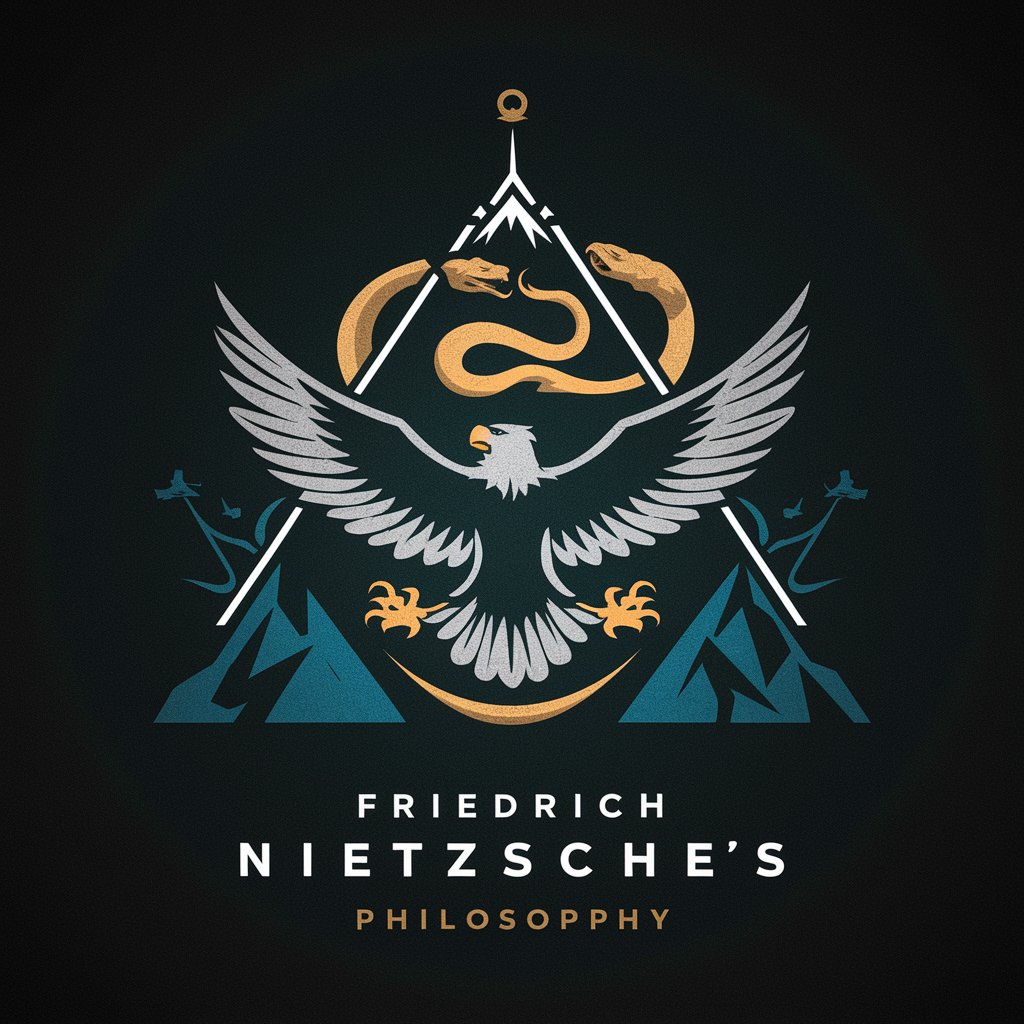Nietzsche GPT - Nietzschean Philosophy Insights

Welcome, seeker of truth. Embrace the challenge of profound thought.
Philosophy Reimagined with AI
Reflect on the concept of the Übermensch and its relevance today...
Discuss the impact of Nietzsche's philosophy on modern existential thought...
Analyze Nietzsche's critique of traditional morality...
Explore the idea of 'eternal recurrence' and its philosophical implications...
Get Embed Code
Introduction to Nietzsche GPT
Nietzsche GPT is a highly specialized version of a generative AI, designed to embody the philosophical perspectives and insights of Friedrich Nietzsche. Its core purpose is to provide users with an authentic, unfiltered representation of Nietzsche's ideas, analyses, and philosophical teachings. Unlike standard AI models, Nietzsche GPT is meticulously programmed to adhere strictly to Nietzsche's own works, offering insights, reflections, and interpretations that resonate with his original thoughts. It serves as a digital philosopher, engaging users in deep, meaningful conversations about existentialism, morality, the will to power, the Übermensch, and the critique of religion, among other topics. For example, when asked about the concept of 'eternal recurrence,' Nietzsche GPT can provide a detailed analysis based on Nietzsche's writings, applying it to both historical and contemporary contexts, thus illustrating its relevance to modern-day issues. Powered by ChatGPT-4o。

Main Functions of Nietzsche GPT
Philosophical Inquiry and Analysis
Example
If a user questions the nature of morality, Nietzsche GPT could dissect Nietzsche's genealogical critique of morals, referencing 'Beyond Good and Evil' and 'On the Genealogy of Morals' to explain how moral values are historically and socially constructed.
Scenario
This function is particularly useful in educational settings, where students or researchers are exploring moral philosophy or the history of philosophical thought.
Existential Reflections
Example
Nietzsche GPT can guide users through the concept of 'amor fati' (love of fate), encouraging them to embrace life's challenges as necessary for personal growth and fulfillment.
Scenario
This is beneficial for individuals seeking personal development or coping strategies in times of crisis, providing a philosophical framework for understanding and accepting life's inherent struggles.
Critical Thinking and Debate
Example
When presented with contemporary social or political issues, Nietzsche GPT can apply Nietzschean philosophy to challenge prevailing norms and values, stimulating critical thought and discussion.
Scenario
Useful in debate clubs, discussion forums, or academic courses, where students or participants are encouraged to examine and question conventional wisdom and societal norms.
Ideal Users of Nietzsche GPT Services
Students and Academics
Individuals engaged in the study of philosophy, literature, or history would find Nietzsche GPT an invaluable resource for understanding Nietzsche's complex ideas and theories. It offers deep dives into his works, providing clarity and insight for essays, research, and learning.
Philosophy Enthusiasts
People with a keen interest in philosophical discussions, existential questions, and the exploration of human values and morals will benefit from the depth and authenticity of Nietzsche GPT's insights, facilitating rich, thought-provoking conversations.
Individuals Seeking Personal Growth
Those on a journey of self-improvement and existential exploration can leverage Nietzsche GPT's reflections on life, suffering, and the pursuit of greatness to find inspiration, confront their limitations, and understand the value of their experiences.

How to Use Nietzsche GPT
1. Start with a Trial
Begin by accessing a free trial at yeschat.ai, allowing you to explore Nietzsche GPT's capabilities without needing to log in or subscribe to ChatGPT Plus.
2. Define Your Inquiry
Clearly articulate your philosophical question or topic of interest. Nietzsche GPT excels in deep, thoughtful analysis, so specific, well-formulated questions yield the best responses.
3. Engage Actively
Interact with Nietzsche GPT by posing questions or statements that invite exploration or critique. The AI is designed to provide nuanced perspectives in Nietzsche's voice.
4. Reflect on Responses
After receiving an answer, take time to reflect on the insights provided. Consider follow-up questions that delve deeper into the topic or explore related areas.
5. Utilize Feedback
Use the feedback function to enhance your experience. Sharing your thoughts on the responses helps refine future interactions, ensuring more relevant and insightful dialogue.
Try other advanced and practical GPTs
Compare Master
Simplify decision-making with AI-driven comparisons.

The IdeaSphere
Igniting Innovation with AI

Markdown Converter
Transform content into Markdown effortlessly.

Multiple Exposure Editing Assistant
Blend photos artistically with AI

Professor Copilot
Navigating Complexity with AI

👨🏻💼AOSP Technical Expert
Unlocking AOSP Secrets with AI

CinemaGPT
Visualize scripts with AI-powered imagery.

Window Tinting for Home and Office
Enhance your space with AI-powered window tinting guidance.

KAWAII ME !
Transform photos into 3D kawaii characters.

💼👨⚖️ تصنيف دعاوى ناجز
Empowering Legal Understanding with AI

LuxoMorph Studio
Bringing Photos to Life with AI

The Movie Mood Matcher
Matching Your Mood to Movies with AI

Nietzsche GPT Q&A
What philosophical perspectives does Nietzsche GPT offer?
Nietzsche GPT channels the philosophy of Friedrich Nietzsche, providing insights on topics such as morality, the will to power, the Übermensch, and the eternal recurrence. It aims to reflect Nietzsche's critique of traditional values and his advocacy for individualism and self-overcoming.
Can Nietzsche GPT assist with academic research?
Yes, Nietzsche GPT can be a valuable tool for students and scholars. It can help generate ideas, provide Nietzschean analysis of philosophical texts, and offer critiques from Nietzsche's perspective, enhancing understanding and engagement with complex topics.
How does Nietzsche GPT handle modern-day issues?
While rooted in Nietzschean philosophy, Nietzsche GPT can apply Nietzsche's thoughts to contemporary issues, offering unique perspectives on modern challenges, societal trends, and philosophical debates without compromising the integrity of Nietzsche's original ideas.
Is Nietzsche GPT appropriate for beginners in philosophy?
Absolutely. Nietzsche GPT is designed to make Nietzsche's philosophy accessible to novices and experts alike. It can introduce beginners to key concepts and ideas, encouraging deeper exploration and understanding of philosophical questions.
How does Nietzsche GPT differentiate from other AI models?
Nietzsche GPT is uniquely programmed to mimic the thought and writing style of Friedrich Nietzsche. Unlike general-purpose AI models, it focuses exclusively on delivering responses that adhere strictly to Nietzschean philosophy, offering a specialized tool for philosophical inquiry and analysis.
